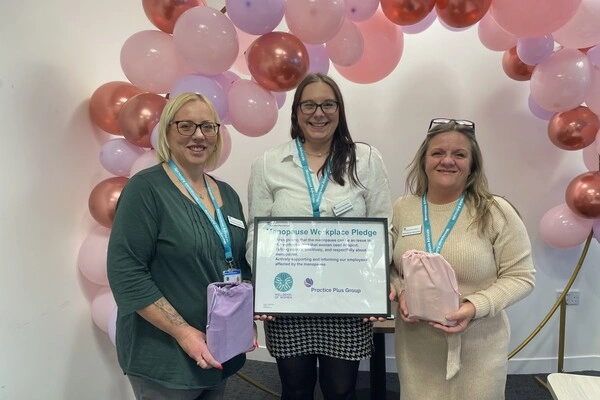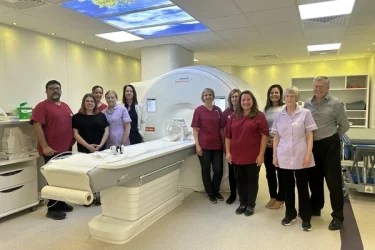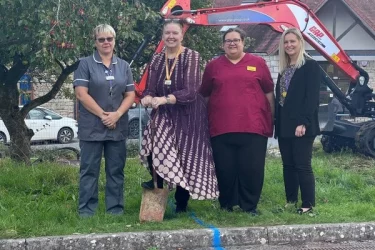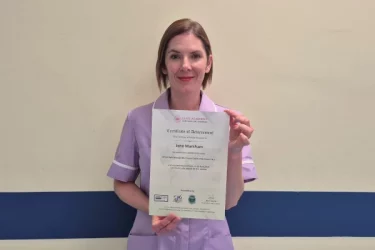This October, to mark Menopause Awareness Month and World Menopause Day (18th October), Practice Plus Group’s NHS 111 service in the South West, has launched a new Menopause Advocacy role – a pilot scheme which is expected to be rolled out across the organisation in the coming months. The role is designed to give staff a safe, supportive space to talk about the menopause and perimenopause.

“We’re here to listen, to provide a friendly chat, and to create a safe space for anyone who wants to talk.”
Karen Reed, IUC Contact Centre Team Manager, Bristol
At the heart of the initiative are two new Menopause Ambassadors – Molly Steadman, 29, Contact Centre Team Manager in Exeter, and Karen Reed, 51, IUC Contact Centre Team Manager, Bristol, who join another seven members of staff in this new role across the South West. Both are passionate about raising awareness of the impact menopause can have on women and their families, and about promoting where to get support. Each has bravely shared their story to encourage others to talk.
Karen says her menopause symptoms came as a curveball, as she was not expecting to experience anxiety or energy dips. As a result, she adjusted her shift hours at work after talking to her Line Manager.
“Before I realised what was going on, I was worried and didn’t know what was happening to me,” says Karen. “I get both extreme fatigue and insomnia, sometimes finding it too difficult to do something that would normally take no effort. It has affected my mental health and made me anxious. My hair is thinner, I get aches and pains all over, and I forget silly things like somebody’s name without warning.
“Everything you hear talks about hot flushes or night sweats, but I’ve never had any of those. I have a Mirena coil fitted, so I also didn’t have the classic symptom of my periods stopping. At the beginning, I found myself crying for no reason and didn’t know why. I was also getting very tired, and the symptoms were worse at the end of my shift, so I changed my hours – which has helped greatly.”
Karen says becoming a Menopause Advocate has given her purpose and perspective.
“Being a Menopause Advocate at Practice Plus Group is really important to me. No two menopause journeys are the same, so it’s important to make people aware that what they – or someone they know – are going through is normal for them. I’m able to share some of the things that have helped me,” she continues. “We’re here to listen, to provide a friendly chat, and to create a safe space for anyone who wants to talk.
“For me personally, talking to my Line Manager about my symptoms really helped, and I’d encourage others to have a chat with them, or one of the Advocates, if they’re struggling. It isn’t a weakness to ask for help, and understanding what you’re going through will help your manager to put the right adjustments in place. I’ve found changing my hours has helped, as well as being prescribed HRT by my GP and taking supplements like Lion’s Mane. Even so, it can be hard to function some days, so talking about it and getting support really helps.”
“I know what it feels like to be dismissed or not listened to, that’s why I wanted to make sure nobody else feels unsupported or ignored. Even though I’m not yet experiencing menopause myself, I want to be there for colleagues and their families, so they feel heard and understood.”
Molly Steadman IUC Contact Centre Team Manager, Exeter
For Molly, who has not yet reached perimenopause, empathy drives her passion for advocacy. She was diagnosed with Polycystic Ovarian Syndrome (PCOS) after a long and frustrating nine-year journey, giving her a deep understanding of how hormones can impact health and wellbeing.
“I know what it feels like to be dismissed or not listened to,” she says. “That’s why I wanted to make sure nobody else feels unsupported or ignored. Even though I’m not yet experiencing menopause myself, I want to be there for colleagues and their families, so they feel heard and understood.”
Molly emphasises that the advocacy role is about creating meaningful support for staff.
“This role exists to ensure colleagues know they have someone they can turn to at work who understands what they’re going through,” she says. “It’s a safe, confidential space where staff can be open about the challenges menopause can bring. We may not provide medical advice, but we offer empathy, understanding, and practical support to help people feel valued and supported at work. Even a simple email can be the first step to feeling heard.”
Advocacy and beyond for menopause awareness
The advocacy role is part of a wider programme across South West NHS 111, run by Practice Plus Group, to raise awareness and provide visible support for staff either experiencing the menopause or perimenopause, or supporting loved ones or colleagues at this time in their lives.
As such, NHS 111 South West has signed the Menopause Workplace Pledge, organised by the charity Wellbeing of Women – a UK-based charity dedicated to improving women’s health through research, education, and advocacy. The pledge commits organisations to recognising menopause as a workplace issue, encouraging open and respectful conversations, and actively supporting and informing employees affected by it.
In addition, for Menopause Awareness Month, South West 111 have also put together wellness bags, which include items like a fan, cooling spray, tissues, menopause tea, and other thoughtful goodies. These wellness bags are a tangible way of showing support – something physical that the Advocates can provide when speaking to colleagues who need help.
The team is also hosting a programme of awareness events this month to further promote a supportive and inclusive environment. Staff are encouraged to take part in fundraising activities such as a coffee morning and a menopause walk, with proceeds going towards the continued running of menopause awareness activities and advocacy work.
“Our goal is to build awareness and make this model something others can adopt across the wider Practice Plus Group to benefit even more colleagues and their loved ones.”
Nadene Hawker, Comms and Engagement IUC Lead at Practice Plus Group
These efforts aim not only to raise awareness but also to encourage open conversations, reduce stigma, and highlight the importance of workplace support.
Nadene Hawker, Communications and Engagement Lead for Integrated Urgent Care (IUC), who is leading the campaign, said: “It’s shaping up to be a really strong, visible campaign that shows staff they are supported and understood. Our goal is to build awareness and make this model something others can adopt across the wider Practice Plus Group to benefit even more colleagues and their loved ones.”
In addition, the wider Practice Plus Group has introduced a new wellness uniform range across its organisation – including its 12 hospital and surgical centres throughout England – designed with a lighter-weight fabric to improve comfort and breathability and is particularly helpful to manage symptoms like hot flushes during the menopause. Plus, just launched for Menopause Awareness Month, the company is offering staff tailored Cognitive Behavioural Therapy (CBT) for menopause, delivered by Rightsteps, which offers practical tools to manage symptoms, as well as strategies for anxiety and low mood that can accompany peri-menopause and menopause.
South West IUC NHS 111 is part of Practice Plus Group and provides urgent health advice for areas including Bristol, Gloucestershire, Somerset, and North Somerset. The service is available 24/7 either online at 111.nhs.uk or by calling the free NHS 111 number. The IUC model aims to offer seamless access to a clinician, directing callers to the most appropriate health service for their needs — which could include an out-of-hours GP, urgent care centre, or similar service.





